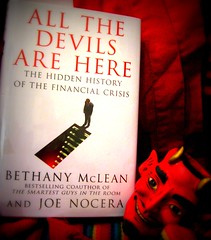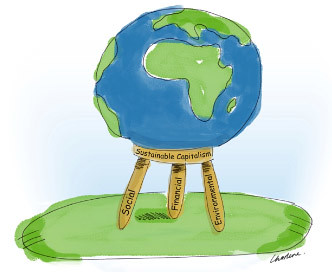Question by : Explain how AAA assets may be created from pools of risky mortgages?
Explain how AAA assets may be created from pools of risky
mortgages each of which individually may be rated as riskier than
AAA. When so many AAA securities defaulted was it because the rat-
ing agencies were corrupt, incompetent or unlucky? To what extent
was this process of the creation of structured products responsible
for the 2007
financial crisis?
Best answer:
Answer by I didn’t do it!
The process is known as ‘credit enhancement’. There are various ways how this can be achieved.
For example, a Company A whose overall credit rating is BB sells its assets to a special purpose vehicle (SPV). The SPV funds the purchase of these assets by issuing asset backed securities to investors. The investors rely on the performance of the particular assets in the SPV and not on the performance of Company A; and this is a major difference: if the transaction is properly structured, a bankruptcy of Company A will not interfere with the payments of the assets, now isolated from the BB rated company. A rating agency, for example Standard & Poors, rate the ability of the company to pay their debt. If the assets are held in an SPV, isolated from Company A with its BB rating, the SPV can have a higher rating if the assets are considered good quality. If this is not sufficient, a bank may issue some form of guarantee, for example a letter of credit issued by a bank for a fee, which guarantees the payment.
Another argument for risk reduction goes as follows: diversifying the risks by pooling and repackaging them into a series of bonds, would reduce the overall risk. For example, the total potential loss amount is higher if you are exposed to the mortgage of one borrower, than if you are exposed to two or more borrowers for the same amount: it is less likely that all different borrowers default at the same time.
However, there is one major flaw, among others, in this concept, which proved to be fatal in the recent financial crises: the buyers of securitized debt instruments do no longer have transparency and understanding of the underlying risks of the instrument that they hold. A holder of a bond which is the result of securitized credit card receivables, for example, does not need to and cannot have a complete understanding of the credit quality of the individual credit card debt that makes up the bond. All he relies on is an abstract mathematical concept of aggregate default probability, which is partly the result of a rating issued by a rating agency exposed to a potential conflict of interest: the rating agencies had an incenticve to issue high ratings because they were paid by the issuer (risk of moral hazard!).
In summary: in theory, securitization of credit should result in a reduction in the overall risk through diversification, compared to the individual components of the asset pool. However, this risk reduction was more than offset through the risk of mispricing the individual risk component and the risk of moral hazard in the origination of these instruments. All this made such instruments much more vulnerable to external shocks, such as an interest rate hike, which ultimately led to the recent collapse of the financial markets.
The securitization of credit and the mispricing of the risks did significantly contribute to the financial crisis, although on their own they would not have been sufficient; other ingredients, such as regulatory imprudence or massive capital inflows into the economy were necessary to create a financial crisis of such a magnitude.
What do you think? Answer below!











